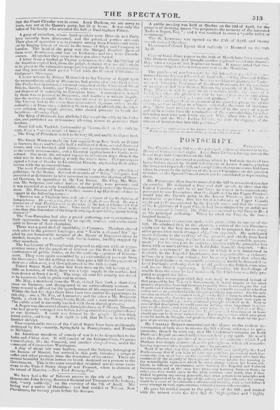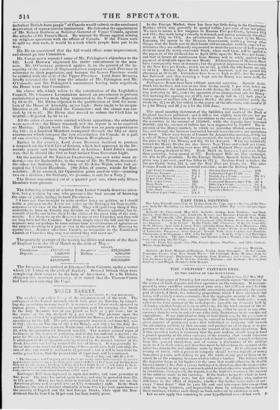The Caftan.! 1 . 01on Bill sans the prirmipal eudject of taseo:si,n
iu the Ileuse 01 Commons last night. Lord Jona Itraatom having moved the h:ease to go into Committee on the bill, The Caftan.! 1.01on Bill sans the prirmipal eudject of taseo:si,n iu the Ileuse 01 Commons last night. Lord Jona Itraatom having moved the h:ease to go into Committee on the bill, sops (1:o mat prevented a petition which he had only received two Lotus before, signed by :19,000 irthabitonts of Lower Canada, praying the home not to pass the !di!, and compbtining that no measures had been token to ascertain the oldnians of the Liner (Ilanadians on the question of onion, es the Special Council could not be considered as representing them.
Air. PA lux(vroN then rose to move that the Wine committed that day six months. delivered a long and dull speech, to show that the Unite:I Caoadas would be of too large an extent to be conveniently governed by one Executive ; that the disaffeeted in the Upper Province would join the French party in the Lower Province, and make a formidable oppoeidon ; that the loyal bthaLitanis of' Upper Canada oneht not tt le• e:IL'on.1):red by the preach race; and that the consent of the 1...`giSI More of I. peer Canada had been obtained by an unfair use of .s eta meet helanonse. Mr. Paltimston referred to Sir Francis as his principal authority. Whea he cited Sir rratt:is, the house laughed heartily.
Mr. \\'imte.fat ill„11,sToNE spoke siith great ebility in support of the bill. IIC admitted that, ia the abatreet, a. union of the t..vo Provinces 'night not ho the best measure that (-odd be proposed, bttt to every other propoeition much etronger object :xis appeared. He anticipated much in the atagking of the measere, and chiefly from Lord
porbane ar s must unhappy declaration in favour or govern- ment." not his owl' part, he eotirely eeineitled with the principles kid. down with so much clearness in Lard John Bassein: despatch. " Re- spu;;aible governmeet' in the sena': in which it was understood in Fe:eland, in the Imperial Legialuture, was impraeticeble—a visionary notion—in a dep.:mama colony ; but he gvemly feared that when the tritited Legislature inet. responsible ;toyer ee.•••1 wonld be demanded ou Lord Durham's nethority that it i.r ,h,.••1 the British connexion and inaare British supremagy. • , -,:eaL ea its forebodings of trouble front the cause he hal memieeed, Cla.1-:,ne was fully pre- pared to support the bill—
When there was no plan which they wire ready to recommend instead of
that proposed by her Cr./1.1'11111CM, it would require in Lis mind grounds of pernliar force mat elcoroCba to jlistify dote ill entering on the war Of Pettit; ran Ptdzellial Ile for one serer would consent to take that
course unit tis on grounds bought peculiarly imperative. Oa the only
oeL'.suon on which a:: 't, :t tout, at teak plocc—he did not Mean it/ allude to, more than to name. the Jont•lica qa,stb it—nbeher the Opposition were right or
wrong, they thought a g con Citation:a principle involved in it. Next to cases of that description. he could conceive nothing more important in refer-
ence to all colonic and particultoly witit refer, :lee Col.-'111:3 of Eng- land in North Amevica, tic Legi,•!.•.Lire red Covernment at home should present to Clem) as united front. !'pea any T7,;tioa which gave great room fer doubt, he thought great sacrifices ou,lit to i.e made fur the pur- pose of preserving united action.
Mr. Cilaillnia BULLER congratulated the House on the evident de- termination of both sides to discuss the bill without reference to party interests; though he must say, that Mr. t:iaditone's remarks on Lord
turbulent British-born people" of Canada would submit to the continued deprivation of representative institutions. He defended the appointment of' Mr. Robert Baldwin as Solicitor-General of Upper Canada, against the attacks of Sir Francis Head. He warned the House against mixing up religious questions with the affairs of Canada. If the Union were to split on that rock, it would be a rock which people here put its its way.
IlumE considered that the bill would effect some improvement, and should go into Committee,
Mr. COLQE110EN repeated some of Mr. Pakington's objections to the bill. Lord Howscx expressed his entire concurrence in the mea- sure. Mr. O'Cossw, protested against it, on the ground of the in- equality of the number of Representatives assigned to each Province in reference to their population, and because the Lower Province would be saddled with the debt of the Upper Province. Lord Jong Russrm, briefly defended the bill from the attacks of Mr. Pakington and Mr. O'Connell ; and Mr. Pakington's amendment having been negatived, the House went into Committee.
On clause 4th, which refers to the constitution of the Legislative Council, Mr. CnattLys LUSHINGTON moved an amendment to prevent ecclesiastical persons from being summoned to the Council—Rejected, by 83 to 29. Mr. liumn objected to the qualification of 500/. for mem- bers of the House of Assembly, as too high : there ought to be no qua- lification at all. lie divided the Committee ; and the clause was car- ried, by 94 to 27. Mr. Huns: also moved to reduce the Civil List to 20,0001.—Rejected, by 88 to 14.
All the other clauses were carried without opposition ; the schedules were agreed to the House resumed, and the report is to be received on Monday. [Quick work this. But there was no party opposition to the bill ; so a hundred Members scampered through the fifty or sixty enactments Which compose the new constitution for Canada in a part of one evening's sitting. Poor Sir Francis Wronghead.]
Earlier hi the evening, Lord JOHN RessELL declined to produce a despatch on the Civil List of Guiana, which had appeared in the De- merara papers and been republished in London : Lord John's reason was, that he should like first to hear further from Governor Light.
On the motion of Sir THOMAS FREMANTLE', two new writs were or- dered,—one for Radnorshire, in the room of Mr. De Winton, deceased ; the other for Sudbury, in the room of Sir John Walsh, who had ac- cepted the Chiltern Ilimdreds. [Sir John, of course, stands for Rad- norshire. If he succeed, the Opposition gains another vote--counting two on a this is ion ; for Sudbury, we presume, is safe for a Tory.]
The House was counted out at a quarter past one, when only fifteen Members were present.



























 Previous page
Previous page